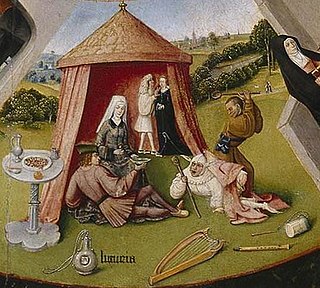Related Research Articles

The Commonwealth was the political structure during the period from 1649 to 1660 when England and Wales, later along with Ireland and Scotland, were governed as a republic after the end of the Second English Civil War and the trial and execution of Charles I. The republic's existence was declared through "An Act declaring England to be a Commonwealth", adopted by the Rump Parliament on 19 May 1649. Power in the early Commonwealth was vested primarily in the Parliament and a Council of State. During the period, fighting continued, particularly in Ireland and Scotland, between the parliamentary forces and those opposed to them, in the Cromwellian conquest of Ireland and the Anglo-Scottish war of 1650–1652.

Marriage, also called matrimony or wedlock, is a culturally and often legally recognized union between people called spouses. It establishes rights and obligations between them, as well as between them and their children, and between them and their in-laws. It is nearly a cultural universal, but the definition of marriage varies between cultures and religions, and over time. Typically, it is an institution in which interpersonal relationships, usually sexual, are acknowledged or sanctioned. In some cultures, marriage is recommended or considered to be compulsory before pursuing any sexual activity. A marriage ceremony is called a wedding.

Lust is a psychological force producing intense desire for something, or circumstance while already having a significant amount of the desired object. Lust can take any form such as the lust for sexuality, money, or power. It can take such mundane forms as the lust for food as distinct from the need for food or lust for redolence, when one is lusting for a particular smell that brings back memories. It is similar to but distinguished from passion, in that passion propels individuals to achieve benevolent goals whilst lust does not.
Adultery is extra-marital sex partaken by a spouse, or premarital sex partaken by a betrothed person, that is considered objectionable on social, religious, moral, or legal grounds. Although the sexual activities that constitute adultery vary, as well as the social, religious, and legal consequences, the concept exists in many cultures and shares some similarities in Christianity, Judaism and Islam. Adultery is viewed by many jurisdictions as offensive to public morals, undermining the marriage relationship.

A wife is a woman in a marital relationship. A woman who has separated from her partner continues to be a wife until their marriage is legally dissolved with a divorce judgment. On the death of her partner, a wife is referred to as a widow. The rights and obligations of a wife to her partner and her status in the community and law vary between cultures and have varied over time.

The Rump Parliament was the English Parliament after Colonel Thomas Pride commanded soldiers to purge the Long Parliament, on 6 December 1648, of those members hostile to the Grandees' intention to try King Charles I for high treason.
Zināʾ (زِنَاء) or zinā is an Islamic legal term referring to unlawful sexual intercourse. According to traditional jurisprudence, zina can include adultery, fornication, prostitution, rape, sodomy, incest, and bestiality. Zina must be proved by testimony of four Muslim eyewitnesses to the actual act of penetration, or a confession repeated four times and not retracted later. The offenders must have acted of their own free will. Rapists could be prosecuted under different legal categories which used normal evidentiary rules. Making an accusation of zina without presenting the required eyewitnesses is called qadhf (القذف), which is itself a hudud offense.

The legal rights of women refers to the social and human rights of women. One of the first women's rights declarations was the Declaration of Sentiments. The dependent position of women in early law is proved by the evidence of most ancient systems.
Rajm in Islam refers to the Hudud punishment wherein an organized group throws stones at a convicted individual until that person dies. Under some versions of Islamic law (Sharia), it is the prescribed punishment in cases of adultery committed by a married person which requires a confession from either the adulterer or adulteress.

Matthew 5:32 is the thirty-second verse of the fifth chapter of the Gospel of Matthew in the New Testament and part of the Sermon on the Mount. This much scrutinized verse contains part of Jesus' teachings on the issue of divorce.
The concept of rape, both as an abduction and in the sexual sense, makes its appearance in early religious texts.
Extramarital sex occurs when a married person engages in sexual activity with someone other than their spouse.
Events from the year 1650 in England, second year of the Third English Civil War.
Christian views on divorce find their basis both in biblical sources and in texts authored by the Church Fathers of the early Christian Church, who were unanimous in the teaching regarding the issue.

"Thou shalt not commit adultery" is found in the Book of Exodus of the Hebrew Bible. It is considered the sixth commandment by Roman Catholic and Lutheran authorities, but the seventh by Jewish and most Protestant authorities. What constitutes adultery is not plainly defined in this passage of the Bible, and has been the subject of debate within Judaism and Christianity. The word fornication means illicit sex, prostitution, idolatry and lawlessness.
Colonial America bastardy laws were laws, statutes, or other legal precedents set forth by the English colonies in North America. This page focuses on the rules pertaining to bastardy that became law in the New England colonies of Massachusetts, Connecticut, and Pennsylvania from the early seventeenth century to the late eighteenth century. The colonies established many laws based on a combination of old English common law and their religious faith. European settlers established rules to guide society upon their arrival in North America. Many of these rules strongly resembled the established guidelines set forth by England. Although the laws differed initially in their creation and enforcement, by the late eighteenth century, the New England colonies and the colony of Pennsylvania had altered their laws pertaining to bastardy to be mirror images of the laws in effect in England.

Fornication is generally immoral sexual intercourse between two people not married to each other. When one or more of the partners having consensual sexual intercourse is married to another person, it is called adultery. John Calvin viewed adultery to be any sexual act that is outside the divine model for sexual intercourse, which includes fornication.
In Islam, human sexuality is governed by Islamic law, also known as Sharia. Accordingly, sexual violation is regarded as a violation of moral and divine law. Islam divides claims of sexual violation into 'divine rights' and 'interpersonal rights' : the former requiring divine punishment and the latter belonging to the more flexible human realm.
The history of adultery in English law is a complex topic, including changing understandings of what sexual acts constituted adultery, unequal treatment of men and women under the law, and competing jurisdictions of secular and ecclesiastical authorities. Prosecution for adultery as such ceased to be possible in English law in 1970.
Adultery laws are the laws in various countries that deal with extramarital sex. Historically, many cultures considered adultery a very serious crime, some subject to severe punishment, especially in the case of extramarital sex involving a married woman and a man other than her husband, with penalties including capital punishment, mutilation, or torture. Such punishments have gradually fallen into disfavor, especially in Western countries from the 19th century. In countries where adultery is still a criminal offense, punishments range from fines to caning and even capital punishment. Since the 20th century, criminal laws against adultery have become controversial, with most Western countries repealing them.
References
- 1 2 Lay, Paul (2021) [2020]. Providence Lost. London: Head of Zeus. p. 176. ISBN 9781781853368.
- ↑ Kenyon, J. P. (1969). "The Interregnum, 1649–1660". In Kenyon, J. P. (ed.). The Stuart Constitution. Cambridge University Press. p. 330.
- ↑ Cawthorne, Nigel (2004). The Strange Laws of Old England. London: Piatkus. ISBN 0-7499-5036-6.
- 1 2 Weinstein, Jeremy D. (1986). "Adultery, Law, and the State: A History". Hastings Law Journal. 38 (1): 195–238.